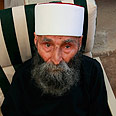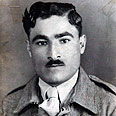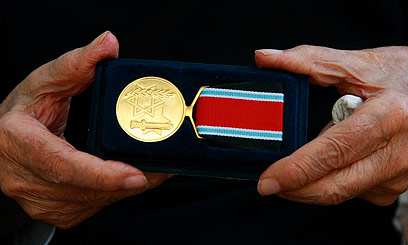
Daoud Bessis today
Photo: Shaul Golan

Bessis during his military days
Photo: Shaul Golan
Daoud Bessis' life story sounds as if it was taken out of an action movie envisioned by an extremely imaginative director.
After all, who would think there could be a common thread between a young idealistic Druze from Daliyat al-Karmel and the war against the Nazis, saving Jews, staying in prisoner camps established by the Germans and fighting with the Free French Forces?
Heroic Soldier
Matan Zuri
Ynet special: Emmanuel Moreno a legend whose photo cannot be published even posthumously
The young soldiers were sent to train at Sarafand Camp, later known as Tzrifin, and were later stationed in Libya, where they joined British troops, led by General Bernard Montgomery, in a bitter battle against the German African Corps, commanded by Field Marshall Erwin Rommel and reinforced by Italian brigades.
After the battles in Libya, the Druze volunteers were sent with their battalion to Greece, which was under German, Italian and Bulgarian occupation – each controlling a different part of the country.
In the fall of 1943, when Italy withdrew from the war and its troops relinquished control of Greek territory, the British attempted to invade the area, as they have previously done in Sicily and Italy.
While the two former invasions were crowned with success, the invasion to Greece failed, and many of Her Highness' soldiers were taken into German captivity – Daoud and his friends included.
Because of uniform
For many years, when asked why he joined the British army, Bessis would reply that he wanted to fight against the Germans, whom he believed started the war, but added that he also joined because he loved donning the military uniform.A few years ago, while giving an interview to local website Portal HaKarmel, which is very popular among the Druze population, Bessis described in detail his experience in German captivity.
At first, the British prisoners were held in Greece, but were later transferred to Italy – to an area controlled by Germany after Italy signed a cease fire with the Allied Forces.
Nearing the end of 1943, the prisoners were moved to Germany. According to Daoud, they were transferred from one base to another for many weeks, until finally in the summer of 1944 they were placed in the southern city of Stalag, which was situated near the border with Austria.
"Many times," Daoud recalled, "When we were taken out of the camps on different occasions, we saw Jewish prisoners that were held in concentration camps and worked in forced labor.
"At first, we didn’t know who these poor souls were; they walked around like skeletons in ripped striped uniform, and later we found out that these were Jews from all across Europe who were sent to the camps and exterminated only because they were Jewish," he said.
"Of course we did everything we could to help them; sometimes we even gave them, secretly of course, a little food such as bread, potatoes, cheese and sausages," Daoud noted.

Fighters against Nazis Medal (Photo: Shaul Golan)
Occasionally," Daoud added, "We also managed to sneak them some underwear and socks. We had to pull many tricks, so that the SS officers guarding them won't notice.
"We pitied these poor souls very much. We, the Druze, were especially in pain because the Jews were our neighbors and friends in Palestine," he said.
According to Daoud, because of the freezing weather many didn't make it, as the Germans didn’t properly heat the POW camps during the harsh winter months. Many prisoners became sick, and never recovered. "We, who came from a warm climate, suffered greatly from the cold weather," he said.
During his time in captivity, Daoud sent many letters to his parents, but got his first reply only 14 months later via the Red Cross.
When the prisoners were paid a visit by the Red Cross, Daoud asked them to hand a letter to his parents, along with £20 (about $31), which he managed to save up from his military wages. To his surprise, Daoud received word that his parents got both the letter and the money only three weeks later.
During their stay in Stalag, Daoud and two of his Druze friends – Hassan Mansur and Fauzi Hasson—decided to escape from the camp. They made all the necessary preparations, and thoroughly studied the area and the German guards' schedule. One evening, the three asked permission to go the camp's restroom.
"We noticed that a few meters from the bathroom there was a small opening in the fence that the Germans haven’t fixed yet, and our escape plan was based on this opening," he said.
"We hid metal crowbars in our clothes and waited for the floodlights to pass us, and then quickly ran to the fence and expanded the opening with the crowbars. When we were finished, we returned to the bathroom and hid in the stalls. After the floodlights passed us again, we crawled out through the opening and disappeared into the forest."
Secret cave
The three knew they were held close to the Austrian border, and that a few kilometers away was the Austrian border with Italy.They hid in the forest, and on the next night crossed the border into Italy, where they were also forced to hide.
"We found a cave in one of the mountains and settled in there," said Daoud. Every night, the three would sneak into desolate farm houses nearby and demand food – often under gun threats with weapons they stole from rangers along the way.
Several months passed, until one day a farm owner told them the Germans withdrew from Italy. The three decided to walk to a nearby city, where they encountered a battalion of the Free French Forces, formed by General Charles de Gaulle.
The French took the three Druze men with them and handed them to British forces.
Daoud and his friends were sent to London and housed at a veterans' residence. They received payments from the British payments officer, until one day they were summoned to the discharge office.
The three then boarded a boat, and sailed back to Israel through Alexandria. Upon arrival, Daoud and his friends were taken to Sarafand Base, where they received their discharge papers.
Daoud recalled that when he finally returned home to Daliyat al-Karmel, after three years and three months of absence, he hugged and kissed a man he thought was his father, until his younger sister told him it was not his father, but one of his uncles.
"In the long time that I have not seen him, my uncle grew a beard, and therefore I thought he was my father," he said with a smile.
His parents, who were not aware that their son has returned, were working in the fields at the time, and rushed home to receive their loved one only after a neighbor ran over to break the happy news to them.
"When my mother heard I returned, she was so excited, she couldn’t even stand on her two feet, and my father had to put her on a donkey and lead it to me," he said.
Surprisingly, the Druze war hero was ever honored by the British authorities.
Daoud's eldest son Ramzi said he and his brothers appealed to the Ministry of Defense in London and the British Embassy in Israel several times, in a request that their father be given the citations he deserved as a soldier during World War II, but all their efforts were in vain.
When his sons requested to receive a stipend for his contribution, they were told that only those who were injured in battle were eligible, and because Daoud fortunately wasn't injured, he was not an entitled to the money.
Last week, when I sat with Daoud, his wife and several of his 11 children and 40 grandchildren in his Daliyat al-karmel house, his son Ramzi presented me with three medals his father received from the State of Israel.
In May, after the family approached the Defense Ministry, Daoud received the Fighters against Nazis Medal and a decoration for volunteering during the war.
"I am very happy and proud," said the 96-year-old hero, who is the last survivor member of the 10 Druze volunteers.
- Follow Ynetnews on Facebook















